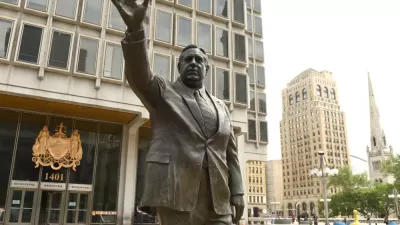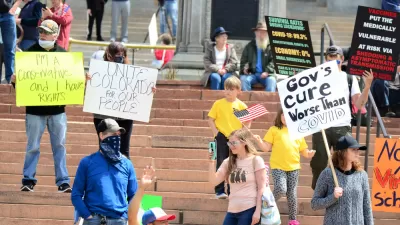The economic and health effects of coronavirus have spread unevenly across racial lines in the United States, as further revealed by new research from the Pew Research Center.

Mark Hugo Lopez, Lee Rainie, and Abby Budiman present new data and analysis on the disparate public health and economic effects of the coronavirus for Black and Hispanic Americans.
The financial shocks of the outbreak have hit Hispanic and black Americans especially hard. When it comes to public health, black Americans appear to account for a larger share of COVID-19 hospitalizations nationally than their share of the population. And in New York City, death rates per 100,000 people are highest among blacks and Hispanics.
In addition to the previous reports cited in that paragraph, new data from Pew Research Center surveys show additional disparities along racial lines in terms of public health and economic experiences in the first few months of the coronavirus pandemic. The article presents five key findings, with more details included in the source article:
- Job and wage losses due to COVID-19 have hit Hispanic adults the hardest.
- Most black and Hispanic Americans do not have financial reserves to cover expenses in case of an emergency.
- The COVID-19 economic downturn has made it harder for some Americans to pay their monthly bills.
- There are sharp racial and ethnic differences in personal experiences with COVID-19 and in concerns about spreading or catching the virus.
- Hispanic and black Americans are more likely than white adults to say cellphone tracking is acceptable in efforts to fight the virus.
For a few ideas about how to respond to the pre-existing conditions that have rendered these racial disparities obvious during the pandemic, see a Planetizen feature by Joan Alexander, with examples from Oakland and Austin.
FULL STORY: Financial and health impacts of COVID-19 vary widely by race and ethnicity

Alabama: Trump Terminates Settlements for Black Communities Harmed By Raw Sewage
Trump deemed the landmark civil rights agreement “illegal DEI and environmental justice policy.”

Study: Maui’s Plan to Convert Vacation Rentals to Long-Term Housing Could Cause Nearly $1 Billion Economic Loss
The plan would reduce visitor accommodation by 25% resulting in 1,900 jobs lost.

Planetizen Federal Action Tracker
A weekly monitor of how Trump’s orders and actions are impacting planners and planning in America.

Wind Energy on the Rise Despite Federal Policy Reversal
The Trump administration is revoking federal support for renewable energy, but demand for new projects continues unabated.

Passengers Flock to Caltrain After Electrification
The new electric trains are running faster and more reliably, leading to strong ridership growth on the Bay Area rail system.

Texas Churches Rally Behind ‘Yes in God’s Back Yard’ Legislation
Religious leaders want the state to reduce zoning regulations to streamline leasing church-owned land to housing developers.
Urban Design for Planners 1: Software Tools
This six-course series explores essential urban design concepts using open source software and equips planners with the tools they need to participate fully in the urban design process.
Planning for Universal Design
Learn the tools for implementing Universal Design in planning regulations.
Caltrans
Smith Gee Studio
Institute for Housing and Urban Development Studies (IHS)
City of Grandview
Harvard GSD Executive Education
Toledo-Lucas County Plan Commissions
Salt Lake City
NYU Wagner Graduate School of Public Service





























